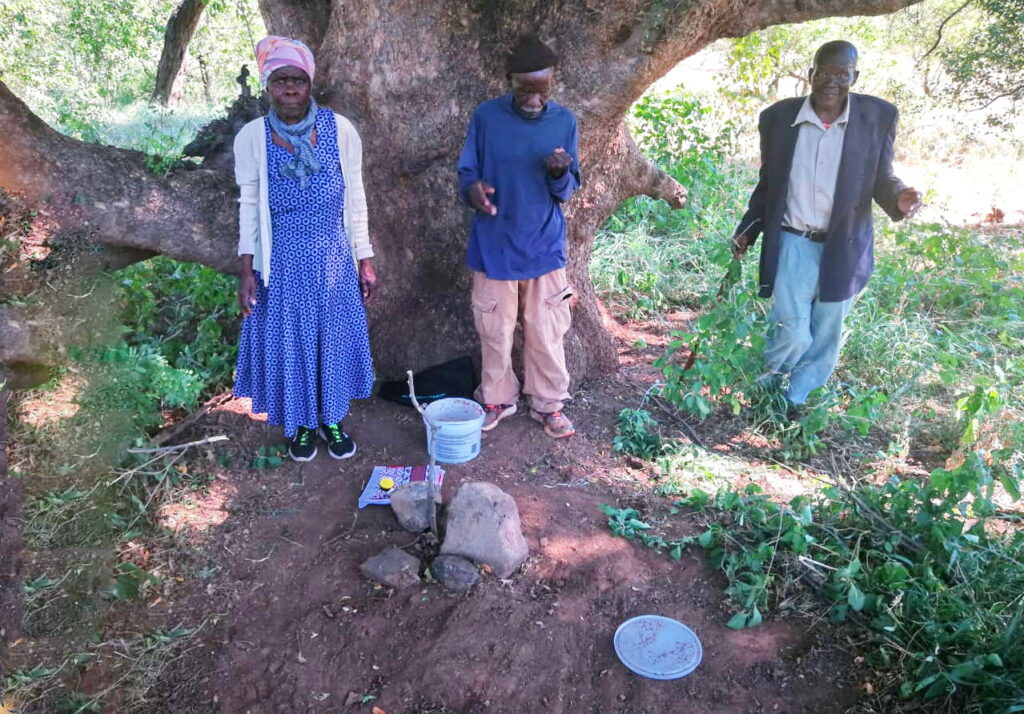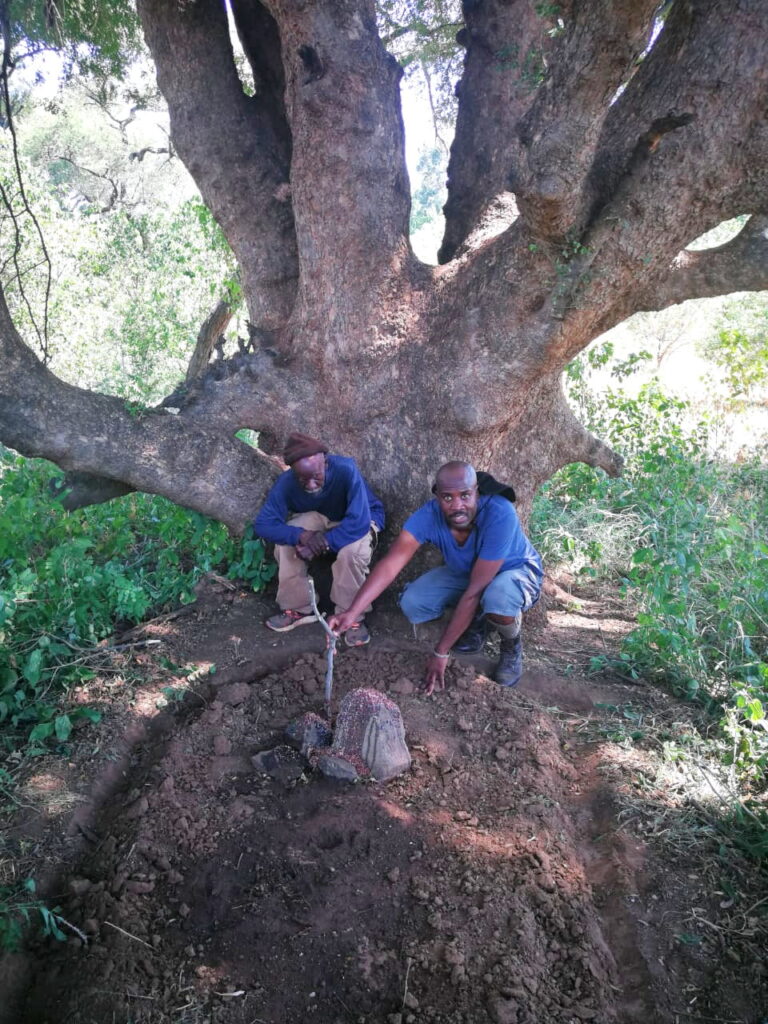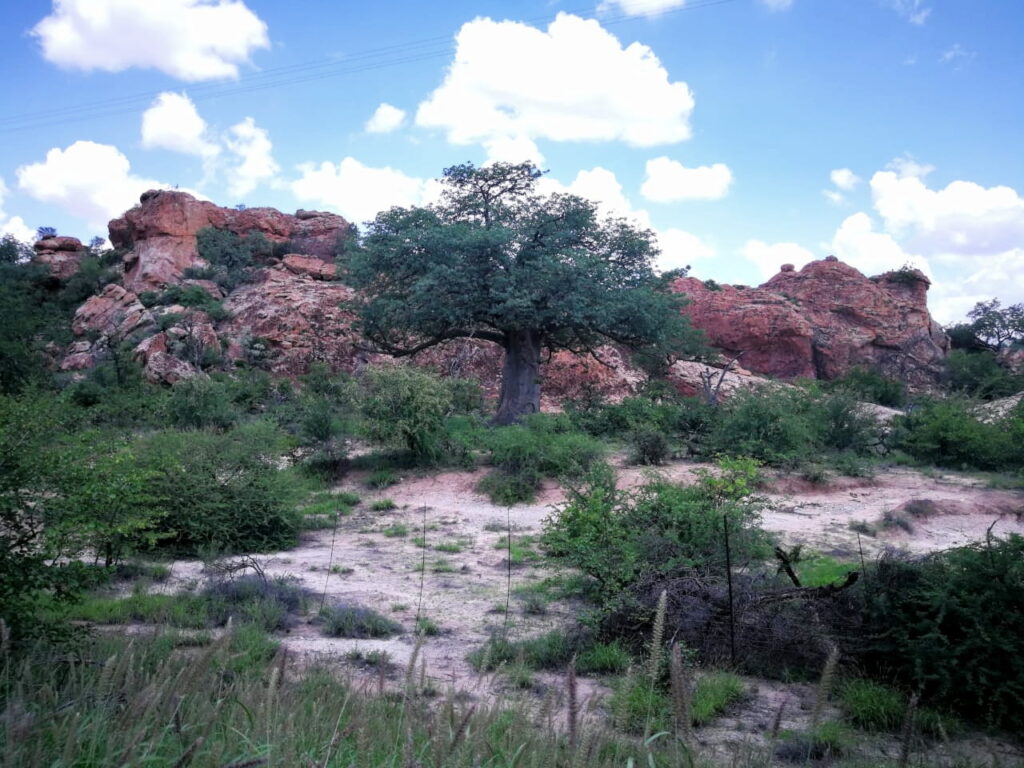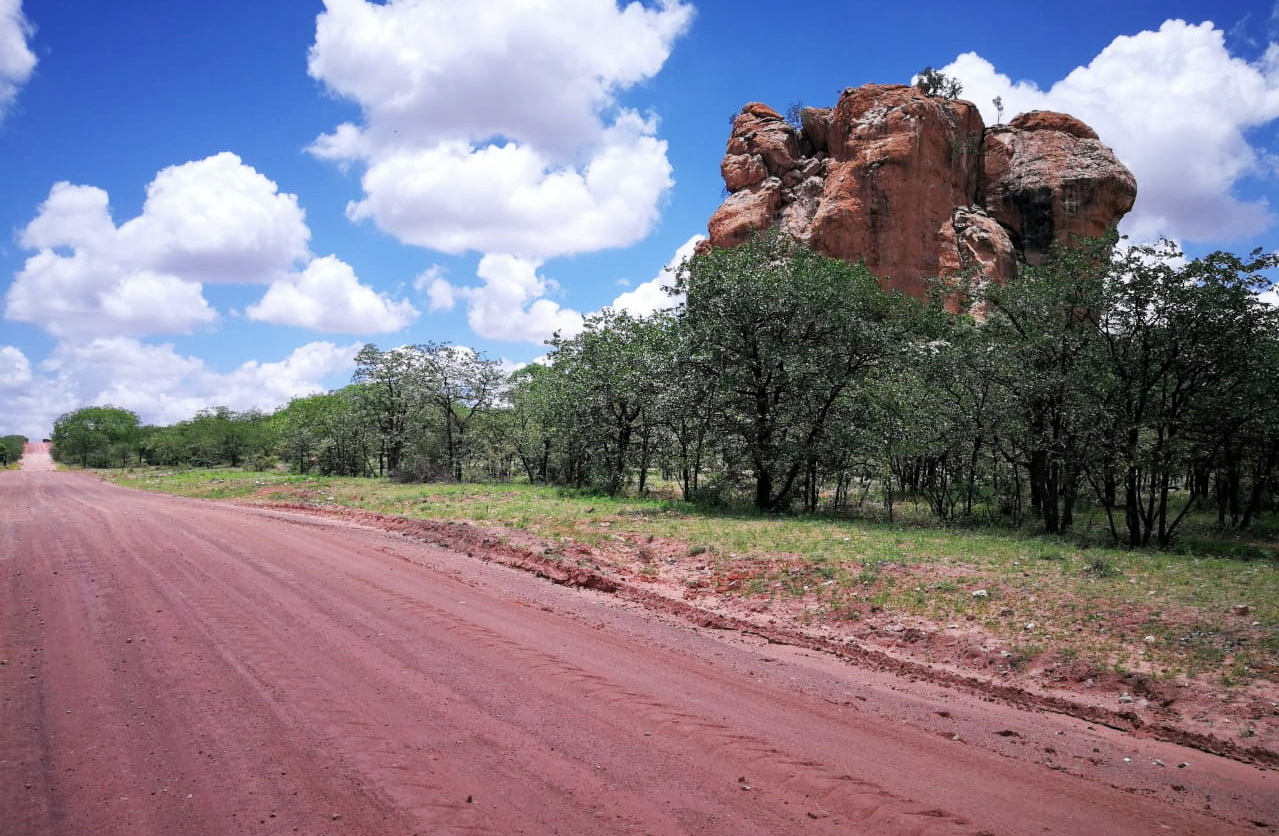Last updated on 19/06/2023
His father and many other elders died before realising their dream of seeing their ancestral land restored back to them. MARUMO MACHETE joins a pilgrimage of elders on a mission to perform rites at the resting place of a great ancestor
At 93, Leauwelo ‘Kgaugelo’ Elias Machete is today, Saturday 8 April 2023, on a journey to pilgrimage at his father’s grave, safely tucked along the Vhembe/Leodi river on the big five roaming Breslau farm.
Breslau – a pocket or portion of land stretching from the border of South Africa with Botswana to the north west and Zimbabwe to the north, was formerly part of Ga-Machete and is proudly captured in the clan’s praise singing.
The clan called this bio-diverse area of land Mabogwa. This is where the most recent Machete patriarch, Motimedi Rantshana Hans Machete who died circa 1952-1958 is buried. He is interred in the land he knew as his own, following his struggle with a mysterious disease that saw him leave to seek a seer’s attention in Botswana.
When he realised that time to meet his ancestors was near, he made his way back home but died, away from his land. He died longing to rest in peace in the land of his ancestors, the land of plenty where the spirit of his father Mmadi Machete and many others of the Ditlou Tja Machete roam. He got his wish and was peacefully committed to the land that birthed him under the sprawling Nyala berry tree – locally called montha tree.
Here today Leauwelo Kgaugelo Machete has come to pay homage to his father, the leader of the Machete people, part of Batwanamba/Bathwanapa of the Great North. At the ripe age of 93, the nonagenarian has made a long journey from Seshego township driven by his grandson, myself, the great grandson of Motimedi, to perform rites at his father’s grave.
My umbilical cord fell in Soshanguve – borwa – but like all sons of Ntebele Phonyoga Petrus Machete, I knew that despite being born in GaRankuwa hospital (now George Mukhari), my people’s land was in the bundus of Ga-Machete in the great north where my family name needs no introduction.
Growing up I knew myself as a Machete prince proud of his heritage and understood that I could never become a fully grown man without alliance with the land of my forebears.
This is also a happy day because after three long years following a struggle with access to his father’s grave, the current owners of the farm Breslau have opened up and allowed the Machetes access to the gravesite.
The owners led by Dave Rudolph have yielded to the Machete’s long initiated request for access to the grave and they wanted the family to identify the gravesite and ascertain where it lies.
This requirement to identify was made by the owners despite the well known secret along these corridors of Limpopo that the land in question had been under the Machete name from time immemorial, when rocks were still tender, a time when the Machete lived harmoniously with elephants – their totem animals and other majestic game along Ntundu, Leokwe, Mapungubwe, Thaba-tshweu, the rivers Setonki, Leodi, Gulube and many others.
Today Kgaugelo, also accompanied by niece Mmapula Machete and nephew Mokgosane Joel Matshete complete the quartet that is to meet the Rudolph’s entourage.

Dave Rudolph is a man eager to test if this Machete group knows where this grave is and he is flanked by four other men, some bearing the Rudolph name. On arrival at the farm, the Machete are reminded of the dangers of game lurking behind in their habitat, a danger they, especially Kgaugelo, know too well having spent some of his best years as a teenager on Mabogwa.
They head to a game drive vehicle generously offered by the Rudolphs for this grave identifying endeavour. It is decided that the old man sits in front with Dave to lead the way to his father’s gravesite. Of the four Machetes on this family endorsed journey, only me, the youngest at 42, does not know the grave.
I only heard of it from fables and narrations by the Machete seniors, including my late father Ntebele, who led the Machetes to one of the largest land claims in the country and Limpopo province.
Ntebele’s wish was for the family to erect a game friendly gravestone for the Machete patriarch. I have obliged and am now leading the way to ensure that my father’s wish is fulfilled.
On the way to the gravesite, Kgaugelo must reboot his 93 year old brain’s hard drive to locate the site. He knows the site too well after being to his dad’s grave numerous times.
But with now a little of 15 years since setting foot on the grave, the road to locate the site wasn’t going to be a walk in the park. Assisted by 78 year old Mokgosane, the two elderly Machetes recalibrate their minds and go on a trek to retrace their steps into their youth when they used to go to the grave.
Kgaugelo sees a deadroad that heads north east and stops to focus, he then positively identifies the road as the one they used when going to Botswana and everything else then falls into place.
Twelve minutes later he sees the Mopani trees lining the game drive and then politely asks Dave, the driver to stop. He now has his bearings aligned and leads the group on foot balancing on a walking stick. He tells the grouping to look for the Nyala berry tree.
“Motlogolo nyakang mohlare wa Montha. Ke moo Rakgolo wa gago a robetšego gona.”
We head down on the slope that leads to the Limpopo river, and while I walk slowly behind with the old men wary of wild animals, the other members advance to the front and Mokgosane leads the pack also having calibrated his mental GPS.
About 10 metres further appears the majestic montha tree with a big improvised mountain rock as a headstone and a pile of other smaller rocks stacked together at the knees of the tree.
Finally we have arrived at Rakgolo’s grave that I heard so much about and never gotten a chance to visit before. Goosebumps and butterflies fill my body as we kneel on the head of the grave under a cool breeze and shade under which the Machete patriarch lies in rest.

South Africa’s native communities were deprived of their land rights not only as a result of the Native Lands Act of 1913 but bore the brunt of systemic legislation that spans various epochs of unfair government laws as early as the Crown Lands Disposal Ordinance of 1917 and the Land Settlement Acts and the Crown Lands Disposal Act of 1922.
Following multi-party elections that paved a way for an inclusive government in South Africa, a legal basis was enabled providing for restitution and land reform. The South African Constitution of 1993 (interim) and its successor of 1996 gave a platform for dispossessed communities to lay claim to the land they were unfairly robbed of since 19 June 1913, and the Machete community duly exercised their rights.
A batch of legislation was enacted to smooth the transition to land restitution, but many community still lie in wait.
The government has put in place various statutes, including the Communal Property Associations Act 28 of 1996, Extension of Security of Tenure Act 62 of 1997, Land Reform (Labour Tenants) Act 03 of 1996, Land Restitution and Reform Laws Amendment Act 78 of 1996, Restitution of Land Rights Act 22 of 1994 and the Restitution of Land Rights Ammendment Act 48 of 2003, as well as the Upgrading of Land Tenure Rights Amendment Act 34 of 1996 to facilitate for the restoration of land rights to previously deprived natives, but the challenges remain with vast claims still unresolved and some fingers pointing mostly at inept public officials and rogue officials who are easily corruptible and colluding with enemies of just progress.
The Machete community lodged a land claim with the Limpopo Regional Land Claims Commission in 1998.
The large part of the farms claimed are yet to be restituted. Other surviving siblings of Rakgolo Kgaugelo settled in Botswana in Bobonong, Mathathane, Molalatau and Francistown.
The claim was validated by the authorities as early as 2008 following an extensive research and site inspections with the Machete elders – mostly nonagenarians and octogenarians who were spared by the ancestors to help furnish the necessary historical accounts and oral history of the dispossession process before they get committed to the afterlife.
Today, 25 years later, many of those who supported Ntebele Phonyoga Machete to put the claim together, giving evidence by pointing out graves, family ruins, farm lands, kraals and water ways where they used to draw their water and quench their animals’ thirst, have since passed on.
Only two farms, Denstaat (bordering Mapungubwe World Heritage Site) and Dirleton (part of what used to be a wider ga-Maloto have been handed over to the Machete Land Claim delegation.
The Ga-Machete land is situated in the Vhembe District municipality along the R521, R523 and the R572 ranging from Alldays heading north towards the South Africa-Botswana Pontdrif border gate and includes areas now called Evangelina, Bridgewater, Ratho, Donkin, Breslau, Weipe, Littlemuck, Dirleton, Machete, Samaria, Denstaadt and many other farms falling under the community’s validated land claim, number KRP694.

These vast areas of land, home to elephants, baobab and mopani trees had their native names before being taken over by white farmers and game breeders following the enactment of discriminatory laws that dispossessed many natives of their ancestral land. These lands were then partitioned and renamed for the convenience of those who were favoured at those times.
The area that the Machete community, led by representatives of their royal family, claimed had their indigenous names and rich history.
Leokwe Hill (now Little Muck) had the royal headquarters where Kgosši Motimedi Rantshana Machete reigned.
Other regions (meboto) included Ga-Mokokoropo, Mapungubwe, Mabogwa, Ga-Poolo, Ngwenantenga, Ga-Maphari, Kgomonala, Ga-Ramonaga, Mabiditing, Bola-bela, Madihloboko, Meleteng-ya-Ditau where De Beers’ Venetia Mine is now located, Ga-Mokhulu, Gulobe, Ga-Maloto (Dirleton), Ga-Tshipi-Boloko, Ga-Mathaba, Ga-Maphuntshane and Sefapanong.
There were 19 regions (meboto) under Kgoshi Rantshana Machete with headmen as administrators before our people were dispossessed and scattered between Northern Transvaal, Botswana and Zimbabwe.
The land claim was championed by Ntebele Phonyoga Lahlang Petrus Machete, son of Moribula Pharudi Machete and grandson of Kgoši Motimedi Rantshana Machete who passed away in March 2018 having fortunately seen the hand-over of at least two farms to his people.
Ntebele, my father, always told people that he was chosen by the elders to ensure that the land of his ancestors benefits all the Machete descendants and that no one selfishly fills his pockets and disadvantages others.
He steadfastly sought to unite the Machete community and marshalled everyone to lend a helping hand to ensure just restitution for the benefit of Kgoši Motimedi Rantshana Machete’s descendants and all his subjects.
In total, the Machete Royal Family lodged a claim on about 145 farms that were partitioned from their 19 regions. The initial file was claimed to have been lost by the Limpopo Regional Land Claims Commission and when it reappeared, only 56 farms were registered as claimed.
The 56 farms underwent rigorous inspections by land claims officials and Machete community elders and were duly validated and gazetted as according to law.
What the Machete community is now waiting for, is just the hand-over of many of these farms.
Only two farms have already been handed over to the community with stock and crop farming now continuing at the premises. There is talk of an additional seven farms from the Limpopo Rural Development and Land Reform Department nearing hand-over to the Machete. The community waits eagerly, hoping that not another land claims commissioner is retired while they wait. There has been over three land claims commissioners appointed in Limpopo ever since the Machete claim was validated and the community and its royals still wait.
It is more like the government is applying an attritional theory of war against its own people, deliberately waiting out for the older generation to thin out of positions and die, leaving out the care free born-frees who are easily bought with modern day trappings of fast cars, posh houses, Abu Dhabi and Dubai trips, rented yachts and fat bank accounts.
One after the other, the older generations have passed on having not realised their dream to return to their ruins – the ancestral lands where their childhoods laced with happy memories moulded a condition of certainty and continuity that guaranteed that even in their tomorrows, their descendants would have a place they call home, guided by a rich cultural heritage and landscape that had a solid structure from which sons, daughters, nephews and nieces would derive the tools to shape their destinies and feed their offspring from the spoils of the land of their ancestors. – news@mukurukuru.co.za

I know some of the areas mentioned; I worked at Ratho and Weipe farms as a farm worker in 1982. Majority of the farms I visited when I was representing farm workers who had labour disputes with some denied bury site after having worked and lived on the farms for decades. The place is great for human habitation; next to Limpopo river that flows the whole year, lots of indigenous fruits, birds of various types and beautiful mountains and hills.